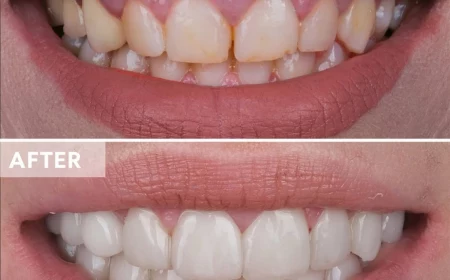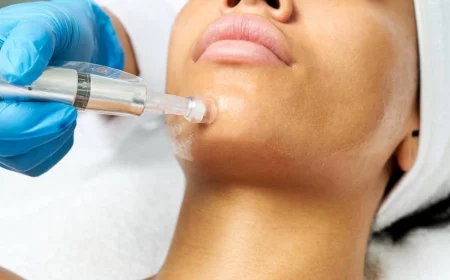What Your Breakouts Are Trying to Tell You (And How to Actually Fix Them)
We’ve all been there. You wake up, look in the mirror, and see a new breakout on your chin or forehead. The first question is always, “Why here?” You’ve probably heard of face mapping, the traditional idea that a pimple on your chin is a direct signal from your kidneys or that a forehead breakout means your liver is struggling. It’s an interesting concept, for sure.
In this article
But honestly, the way skin experts look at it today is a bit more practical. It’s less about a direct phone line from a pimple to an internal organ and more about using location as a clue. Think of yourself as a detective. A breakout’s location is your first piece of evidence, pointing you toward specific triggers like habits, hormones, and even your hair products.
So let’s ditch the mystical maps and talk about what these patterns really mean. This is the stuff that helps you figure out what to do next to get clearer skin.

First, What Exactly Is a Pimple?
Before we get into locations, we need to be on the same page about what a pimple even is. It’s not just random dirt. Every single blemish, from a tiny whitehead to a deep, painful cyst, is born from the same four-step process inside your pores.
It’s basically a chain reaction:
- Too Much Oil: Your skin produces a natural oil called sebum to stay hydrated. But sometimes, hormones (especially androgens) tell your oil glands to go into overdrive.
- Clogged Pores: Skin cells inside the pore get sticky and don’t shed properly. They mix with all that extra oil and form a plug, creating the perfect storm.
- Bacteria Overgrowth: A normal skin bacteria, C. acnes, absolutely loves this clogged, oxygen-free environment. It multiplies like crazy.
- The Inflammatory Response: Your body sees this bacterial party and sends in the troops (white blood cells) to fight it. This battle causes the redness, swelling, and pus we know and hate.
The key takeaway? To stop acne, you have to break this chain at one or more points. Simple as that.

What Your Acne’s Location Is Telling You
Okay, now for the detective work. Let’s look at what’s likely going on when you break out in specific spots.
Forehead & T-Zone Breakouts
This area is often ground zero for acne, especially when you’re younger. The reason is simple: your forehead and nose have a super high concentration of oil glands. More glands = more oil = a higher chance of clogs.
Here’s what to investigate:
- Hair Products: This is a HUGE one that gets overlooked. Gels, pomades, creams, and even some conditioners contain oils and waxes that can easily travel down to your forehead and clog pores. We call this “pomade acne.” Quick tip: Always wash your face after you rinse out your hair conditioner. This removes any residue that might be left on your skin.
- Friction and Sweat: Anything that traps oil and sweat against your skin can cause breakouts. Think hats, headbands, and helmets. I once had a client, a dedicated cyclist, who had a perfect line of pimples right where his helmet strap sat. The fix was simple: he started wiping the strap with an alcohol wipe after every ride, and the acne cleared right up. This is called “acne mechanica,” and it’s very real.

Cheek Acne
When I see acne on the cheeks, my first thought isn’t hormones—it’s external factors. Your cheeks have fewer oil glands, so breakouts here are often caused by something repeatedly touching them.
The usual suspects are:
- Your Phone and Pillowcase: Let’s be real, your phone screen is probably dirtier than you think. Pressing it against your cheek for calls is a fast track to breakouts on one side of your face. Same goes for your pillowcase, which collects oil, sweat, and hair product residue. The fix is easy, though! Wipe your phone down daily, and try to change your pillowcases at least twice a week. Oh, and if you’re a side sleeper, a silk or satin pillowcase can cause less friction than cotton.
- Makeup or Shaving Cream: A thick, oil-based foundation or blush can be a problem. Look for makeup labeled “non-comedogenic,” which just means it’s formulated not to clog pores. For guys, sometimes irritating shaving creams can cause bumps that look just like acne.
- Could it be Rosacea? Sometimes, it’s not acne at all. The cheeks are a classic spot for rosacea, which can cause red bumps and pustules. The tell-tale signs of rosacea are a background of persistent redness or flushing and a total lack of blackheads. If this sounds familiar, it’s worth seeing a pro, because harsh acne products will only make rosacea angrier.

Nose Breakouts (and Those Annoying Dots)
The nose is packed with oil glands, and its pores can appear larger. This leads to a lot of confusion between blackheads and something else entirely.
A good thing to know: Most of the time, those tiny greyish dots on your nose aren’t blackheads. They’re called sebaceous filaments, and they are a completely normal part of your skin. They’re just a mixture of oil and skin cells that line the pore. A true blackhead is a hard, dark plug. Trying to squeeze sebaceous filaments is a losing battle—you can stretch your pores, cause irritation, or even create a full-blown pimple.
While the old idea of nose acne being linked to your pancreas is a stretch, there is a real connection between your gut and your skin. A diet heavy in sugar and processed foods can increase inflammation throughout your body, which can definitely show up on your face. For some people, cutting back on dairy and high-glycemic foods really does help calm down inflammatory acne.

Chin and Jawline Acne
This is the one area where the old face mapping ideas were actually onto something. Breakouts along the lower third of the face—the chin, jaw, and sometimes the neck—are almost always hormonal.
The oil glands here are extra sensitive to hormonal fluctuations. This is why many women get those deep, tender, cystic pimples in the week or two before their period. This type of acne is often more painful and stubborn than breakouts anywhere else.
If your acne is cyclical (shows up at the same time each month), concentrated on your jawline, and consists of deep, sore bumps, you’re likely dealing with hormonal acne. And if you also have other symptoms like irregular periods or thinning hair on your scalp, it could be a sign of a condition like PCOS. That’s a clear signal to check in with a doctor.
In the meantime, focusing on stress management and getting quality sleep can sometimes help, as stress hormones can throw your other hormones out of whack.

Your Game Plan: How to Actually Build a Routine
Okay, so you’ve played detective. Now what? Building a consistent, gentle routine is way more effective than throwing a bunch of harsh products at your face.
A solid beginner’s routine only has a few steps. You don’t need a 10-step regimen that costs a fortune.
Morning Routine (Keep it Simple!)
- Cleanse: Gently wash your face.
- Moisturize: Yes, even if you’re oily! A lightweight, oil-free moisturizer is perfect.
- Sunscreen: This is non-negotiable. Aim for SPF 30+. It prevents acne marks from getting darker and sticking around for months.
Evening Routine (This is where the treatment happens)
- Cleanse: Wash off the day’s grime, makeup, and sunscreen.
- Treat: Apply your chosen acne-fighting active ingredient. (More on this below!)
- Moisturize: Helps your skin barrier stay healthy and tolerate the treatment.
Choosing Your Fighter: A Guide to Over-the-Counter Actives
The skincare aisle can be overwhelming. Let’s break down the three main players you’ll find at places like Target or your local pharmacy. A key piece of advice: start with only ONE of these. Don’t try all three at once!

- Salicylic Acid (BHA): This is an oil-soluble acid, so it’s fantastic at getting deep into pores to dissolve clogs.
Best for: Blackheads, whiteheads, and generally congested skin.
How to use it: A 2% salicylic acid cleanser is a great starting point. You can find excellent ones from brands like CeraVe or La Roche-Posay for around $15-$20.
Heads up: Can be a little drying, so don’t skip your moisturizer.
- Benzoyl Peroxide: This is an antibacterial powerhouse that kills the C. acnes bacteria that fuels red, angry pimples.
Best for: Inflammatory acne—those classic red pimples and pustules.
How to use it: Start with a low concentration, like a 2.5% or 5% gel, and use it as a spot treatment or a thin layer. A tube usually costs between $10 and $20.
Heads up: This stuff can (and will!) bleach your towels, pillowcases, and even t-shirts, so use old linens!
- Adapalene (a Retinoid): This is the heavy-hitter of the OTC world. It works by normalizing skin cell turnover to prevent the pore from getting clogged in the first place.
Best for: Pretty much all types of acne, but it’s especially good for preventing future breakouts.
How to use it: Adapalene 0.1% gel (the most common is Differin Gel, about $15-$30) is a preventative treatment, not a spot treatment. Apply a pea-sized amount to your whole face at night.
Heads up: It takes time! You need to give it a solid 8-12 weeks to see results. You might also experience some initial dryness or even a “purge,” where your skin gets a little worse before it gets better. Stick with it!

Common Mistakes to Avoid (We’ve All Made Them!)
On the road to clear skin, it’s easy to take a wrong turn. Here are some of the most common traps I see:
- Starting too many new products at once. If you get irritated, you won’t know which product is the culprit. Introduce one new thing at a time and give it a couple of weeks.
- Scrubbing your face raw. Harsh physical scrubs with big, jagged bits (like some nut shells) can create tiny tears in your skin and make inflammation worse. Be gentle!
- Skipping moisturizer. You might think your oily skin doesn’t need it, but when your skin gets dehydrated, it actually produces more oil to compensate. It’s a vicious cycle.
- Popping deep pimples. I can’t say this enough: please don’t. Trying to squeeze a deep, under-the-skin cyst will only push the inflammation deeper, making it more painful and dramatically increasing your risk of getting a permanent scar.

When to See a Professional
Over-the-counter products are amazing for mild to moderate acne. But sometimes, you need to call in the experts. It’s probably time to see a dermatologist if:
- You’ve been consistent with a good OTC routine for 3 months with no improvement.
- You have a lot of deep, painful cysts (nodulocystic acne).
- Your acne is leaving scars or dark spots.
- It’s taking a serious toll on your self-esteem. The emotional impact of acne is real, and you deserve help.
A professional can offer things like prescription-strength retinoids, oral medications, and in-office treatments that can make a world of difference. There is no overnight cure, but with a little bit of detective work and a consistent, gentle approach, you can absolutely get on the path to clearer, healthier skin.
Inspiration:

Salicylic Acid (BHA): Think of this as the ultimate pore declogger. It’s oil-soluble, meaning it can penetrate deep inside the pore to dissolve the gunk (sebum and dead skin cells) that leads to blackheads and whiteheads. It’s best for tackling congestion and less-inflamed blemishes. Products like the iconic Paula’s Choice 2% BHA Liquid Exfoliant or CeraVe’s Renewing SA Cleanser are excellent starting points.
Benzoyl Peroxide: This one is a bacteria killer. It targets the C. acnes bacteria that thrive in a clogged pore and cause angry, red, and painful pimples. It’s your go-to for inflammatory acne. You can find it in washes like PanOxyl or as a targeted spot treatment, such as La Roche-Posay’s Effaclar Duo.
So, which to choose? Use salicylic acid for clogged pores and blackheads, and benzoyl peroxide for red, inflamed pimples. You don’t have to pick just one, but introduce them carefully to avoid drying out your skin.










